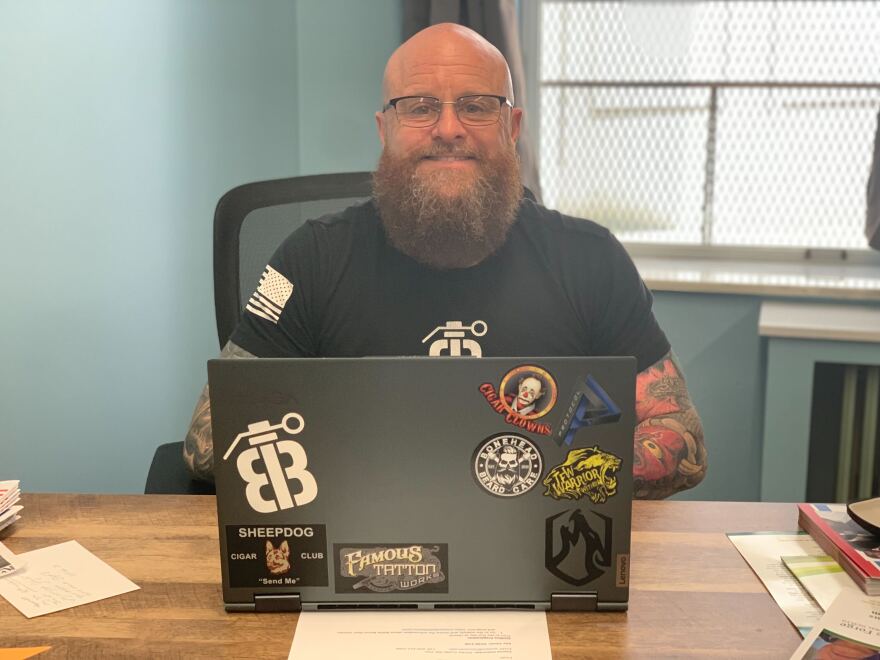ALLENTOWN, Pa. — Chris Yarnell is standing in the basement of St. John's United Church of Christ in Allentown. It's the local office of Battle Borne.
“I’m a little guy, but I’m a big deal,” Yarnell said.
Nearly five years ago, Yarnell, a Marine Corps veteran, and his wife, Cadence Yeatman, founded Battle Borne, a nonprofit organization that helps veterans. The Allentown office opened in January.
- Battle Borne, a nonprofit organization that helps veterans and was started by Easton native Chris Yarnell, recently opened a downtown Allentown center
- The group offers support groups, food distribution, help with program applications and more
- Yarnell said his mission with the organization comes from personal experience with what veterans face
Among its offerings are support groups, food distribution, help with program applications, therapy and yoga, and referrals.
It also refers and connects people to their Veterans Administration benefits, housing, credit counseling, navigate loans, substance abuse counseling, mental health counseling and medical care.
“We're the fill in the gap guys,” Yarnell said, explaining Battle Borne's mission. “That's who we are. For any services that we don't provide, we will link up with people who do and we will refer that to them.
“We do something called a warm handoff. Vets don't like asking for help. If they ask for help, and they get told no, there is a 99.9-percent chance that they are not asking again."
For Yarnell, Battle Borne is a mission.
Because he knows first-hand the difficulties veterans face.
A background of military — and tragedy
Yarnell said he comes from a military family. His grandfather fought during World War II, and his father served during the Vietnam War.
Yarnell said that on the first day of his freshman year of high school, his dad committed suicide.
“That's how he chose to go out,” Yarnell said.
He said his dad was discharged from the Army at 23 after developing diabetes.
“Back then, if you've got a medical problem that they couldn't handle, they discharged you,” Yarnell said.
“He was a very prideful man,” Yarnell said, and at the age of 37, the chronic disease had taken a toll on him.
“His eyesight went, and he had to wear a patch on his eye," Yarnell said. "And then he lost his whole leg. Here was a man who served his country. Thirteen years later, he's on crutches with one leg and one eye.
“I can't speak for him,” Yarnell said. But he said he suspects “he didn't want to live like that.”
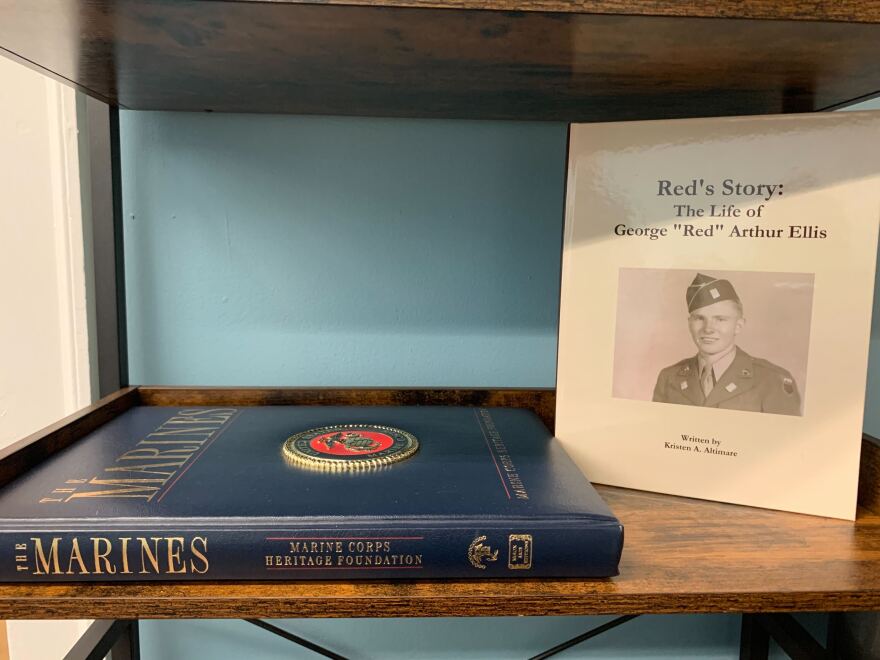
Yarnell followed his forebears into the military.
“I knew I wasn't going to go to college, and my parents couldn't afford it,” he said. “So cool, hey, I should join the military. Because then I can go to college.”
He said he joined the Marines in 1994, but was injured at a training exercise in a rifle range.
“I got an infection, and I didn't know about it,” Yarnell said. “When I woke up the next day, my leg was purple, from my hip all the way down to my toes.”
It was cellulitis. He was rushed him to the hospital, where doctors debated amputating his leg. But he persuaded them he just needed rest, and soon went back to boot camp.
He said he ended up graduating with his platoon and tried to continue serving, but his knees would swell up with fluid.
“I had to get them drained," he said. "And they don't want to keep doing that. They also knew that eventually, that could cause me to be paralyzed.”
With an injury like that, his military career was done. At 20, he was honorably discharged.
Yarnell said that what followed was chaos.
His grandfather, who helped raise him after the death of his father, fell sick, he said. His fiancee at the time had a miscarriage. And he said he felt his future was slipping from his grasp.
“It took me about 25 years of bumping my head in therapy, to understand getting hurt. I was angry."Co-founder of Battle Borne
He became a security guard.
“I've lost friends to war, and I've lost friends to suicide,” he said. “But I didn't have survivor's guilt.” Instead, he said, he had a different type of grief.
“What I had wanted out of my life didn't happen. And it caused a lot of anguish," he said.
Yarnell said he "got wrapped up in other things like drinking and fighting.” At one point, he said, he was homeless. At another, he was incarcerated.
He said he used alcohol and other substances as a crutch, and contemplated suicide.
“It took me about 25 years of bumping my head in therapy, to understand getting hurt,” he said. “I was angry."
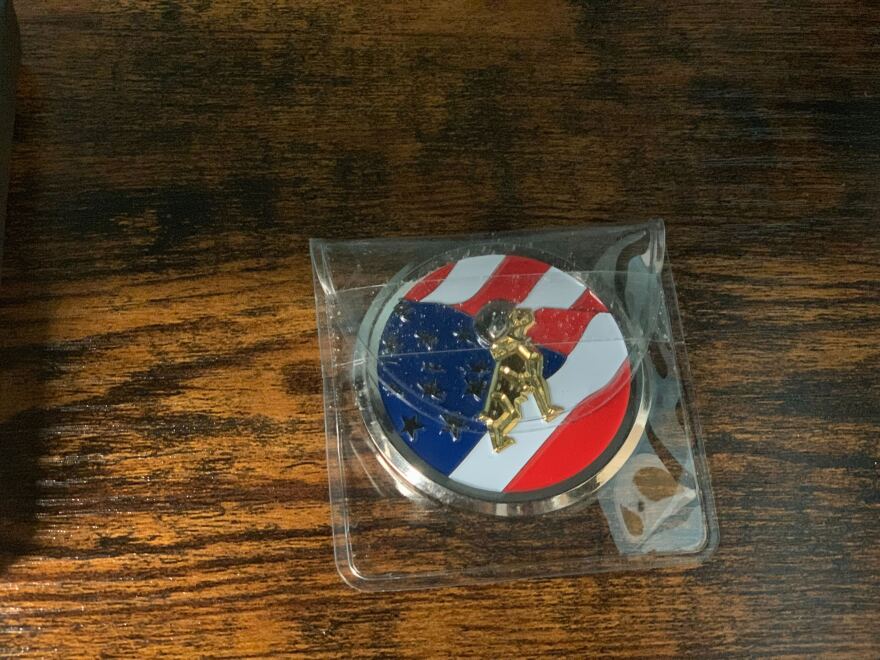
Turning Point
Yarnell said that in 2013, he spent three months under house arrest because of an arrest for driving under the influence. Because he was a veteran, he was allowed to attend support groups at a Veterans Affairs office, as well as a gym for his mental health.
He said his aunt, who helped raise him, put him in touch with a pastor at her church who worked for the Valor Clinic Foundation, which does homeless outreach for veterans.
“Now, my first thought, ‘Why the hell would I want to go out into a homeless camp?’” he said.
“It didn't dawn on me that the thing that I was struggling with for 25 years was that I was no longer in a position to help people, like I was when I was a Marine.”Chris Yarnell, founder of Battle Borne
“It didn't dawn on me that the thing that I was struggling with for 25 years was that I was no longer in a position to help people, like I was when I was a Marine.”
At the homeless camp, he said, he felt a sense of purpose. He volunteered at the organization for three years.
Eventually, he said, he got frustrated by the narrow scope of nonprofits, and decided he wanted to start something that acted as a connector between different organizations.
“We would see veterans come," Yarnell said. "We would see them ask for help with other things. And they would be told. ‘I'm sorry, we don't do that.’
“As a very antagonistic, angry Marine who couldn't figure out why you just didn't want to help other veterans, it wasn't acceptable to me.”
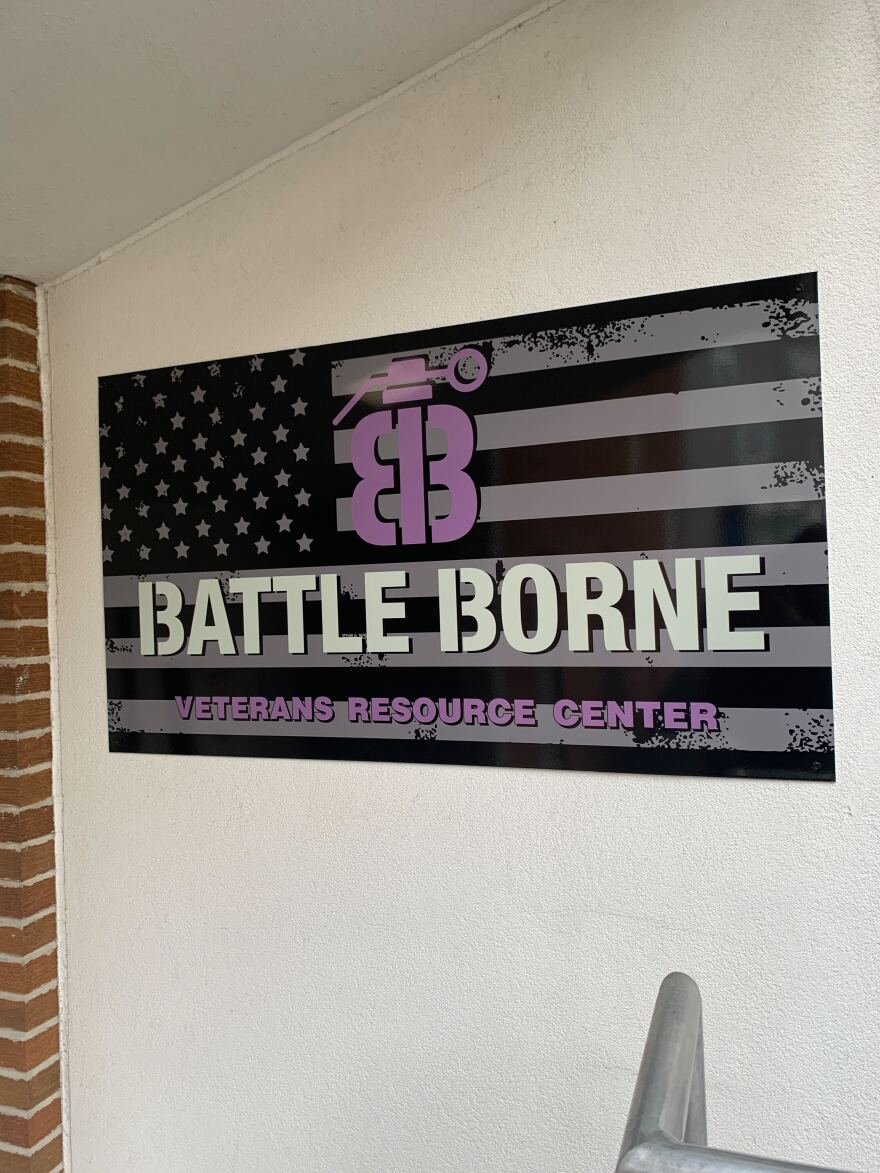
Starting Battle Borne
Yarnell said that in 2018, he had saved $8,000 that he planned to use for a down payment on a house. Instead, he used the money to start Battle Borne.
He said he bought $1,000 worth of T-shirts that he sold out of the trunk of his car. He used the rest of his savings on grocery cards, gas cards and bus passes. He found a volunteer to give Veterans haircuts, and started a support group.
He said that at rallies or community events, he and his wife would set up a table to sell Battle Borne T's and hand out flyers about its mission and hand out the grocery cards.
“We started this to be completely different. We weren't asking people for money. We were just making money.”Chris Yarnell, co-founder of Battle Borne
“We started this to be completely different,” Yarnell said. “We weren't asking people for money. We were just making money.”
He said they’d also volunteer at soup kitchens and churches.
“We're helping veterans and we're doing it remotely,” Yarnell said. “We're coming to them.”
Battle Borne started a website. Someone donated Shopify, an e-commerce platform for businesses, so they could sell clothes online. They went from having a support group every month, to every week. They also started a spousal support group.
Yarnell said the business model didn’t seem sustainable, but he was determined to make it work.
“If you're only ever sending people to other nonprofits, then you can't show the community that you're helping them,” Yarnell said. “But we were able to sustain ourselves."
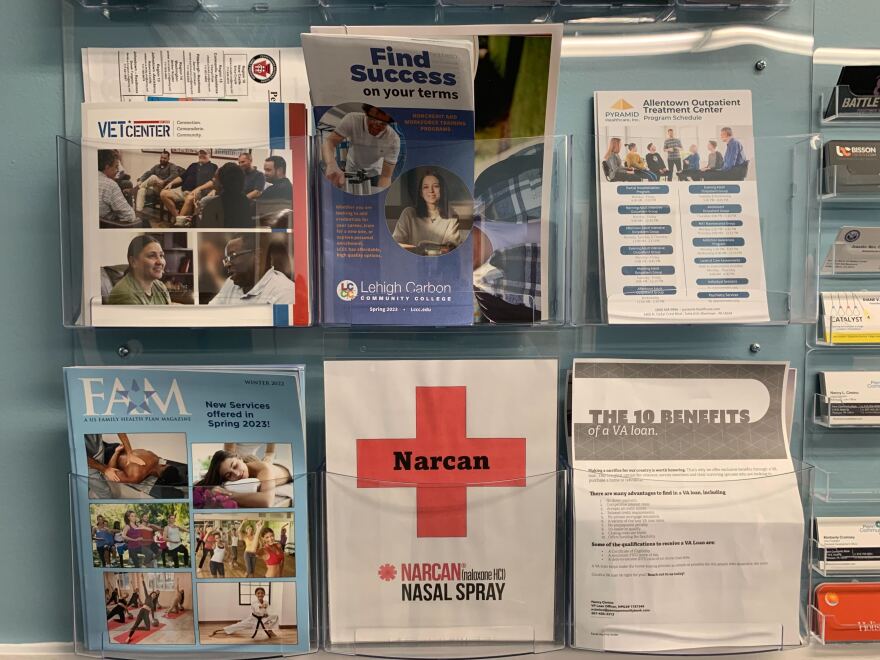
Picking up steam
When the coronavirus pandemic hit in 2020, the VA closed, and Yarnell said it gave Battle Borne an opportunity to step up.
“We thrived during the pandemic," he said
He said he realized there was no longer a place for veterans to start their day and no one to take veterans to their appointments.
So Yarnell took them in his car. He also took them to doctor's appointments, VA appointments, group therapy sessions, job interviews and places to socialize.
Sometimes, he said, he wouldn't even know where he was taking them — just that they needed to go somewhere.
Eventually, he said, he got a $50,000 grant to buy a top-of-the-line Chrysler van.
In 2021, he said he connected with Northampton County to pilot a program on Fridays out of a Palmer Township office. He said the program was so popular, they added Tuesdays.
“Those are astronomical numbers of veterans who weren't getting services anywhere else."Chris Yarnell, founder of Battle Borne
He said that the first quarter of operation, 145 veterans went through its programming. Sixty were referred to mental health or drug and alcohol treatment connected to VA benefits and housing.
“Those are astronomical numbers of veterans who weren't getting services anywhere else,” he said.
They expanded the program to Monroe County to serve veterans from Monroe, Carbon and Pike counties.
Battle Borne's team now is made up of five people and five board members. It also has 15-20 volunteers.
Everyone on the team is either a veteran, or a civilian who is connected to a veteran in some way.
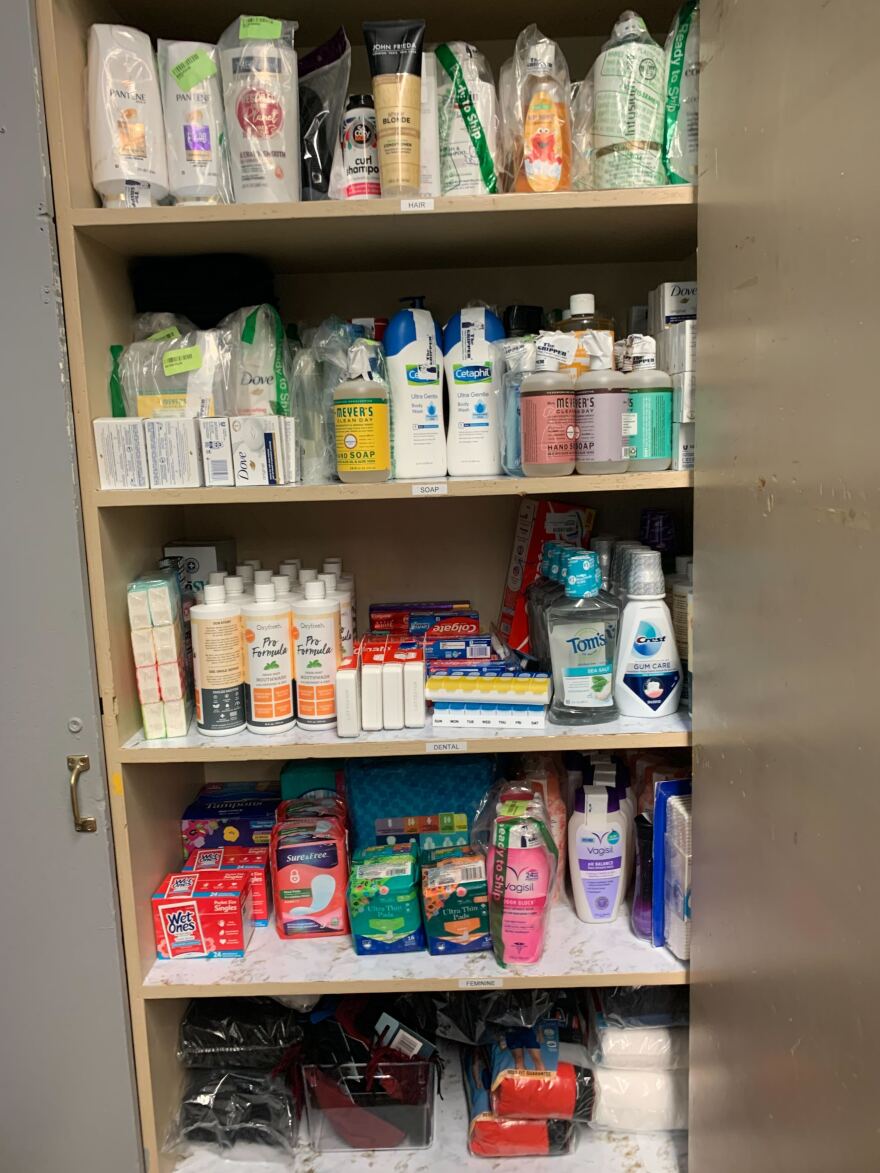
Trauma-Informed Yoga, technology
Battle Borne's massage and yoga services are specifically geared toward veterans who struggle with post-traumatic stress disorder, or PTSD.
The therapists and instructors have trauma certifications to work with people.
The trauma yoga is taught by a Marine and his wife, a yoga instructor.
“Mary teaches yoga; Wayne is like the guide,” Yarnell said. “So Mary will go through the yoga, and Wayne will be an informative voice — ‘OK, guys. The noise you heard go by was a car. You're safe.’”
One of Battle Borne's priority population are ages 40-70, who are unable to work or are starting to have disabilities surface.
Some older veterans struggle with technology, or don't have a cell phone, which prevents them from doing things such as uploading a picture to get a VA ID card, he said.
"A lot of the older veterans, they get frustrated, and they quit. Ultimately, we know what can happen if they're not getting their needs met.”Chris Yarnell, co-founder of Battle Borne
For example, the Lehigh Valley Veterans Affairs Office doesn't have the capacity to sit down and walk them through the process, so they send them to Battle Born, which will take their picture, scan it and fill out the application for them.
"A lot of the older veterans, they get frustrated, and they quit," Yarnell said. "Ultimately, we know what can happen if they're not getting their needs met.”
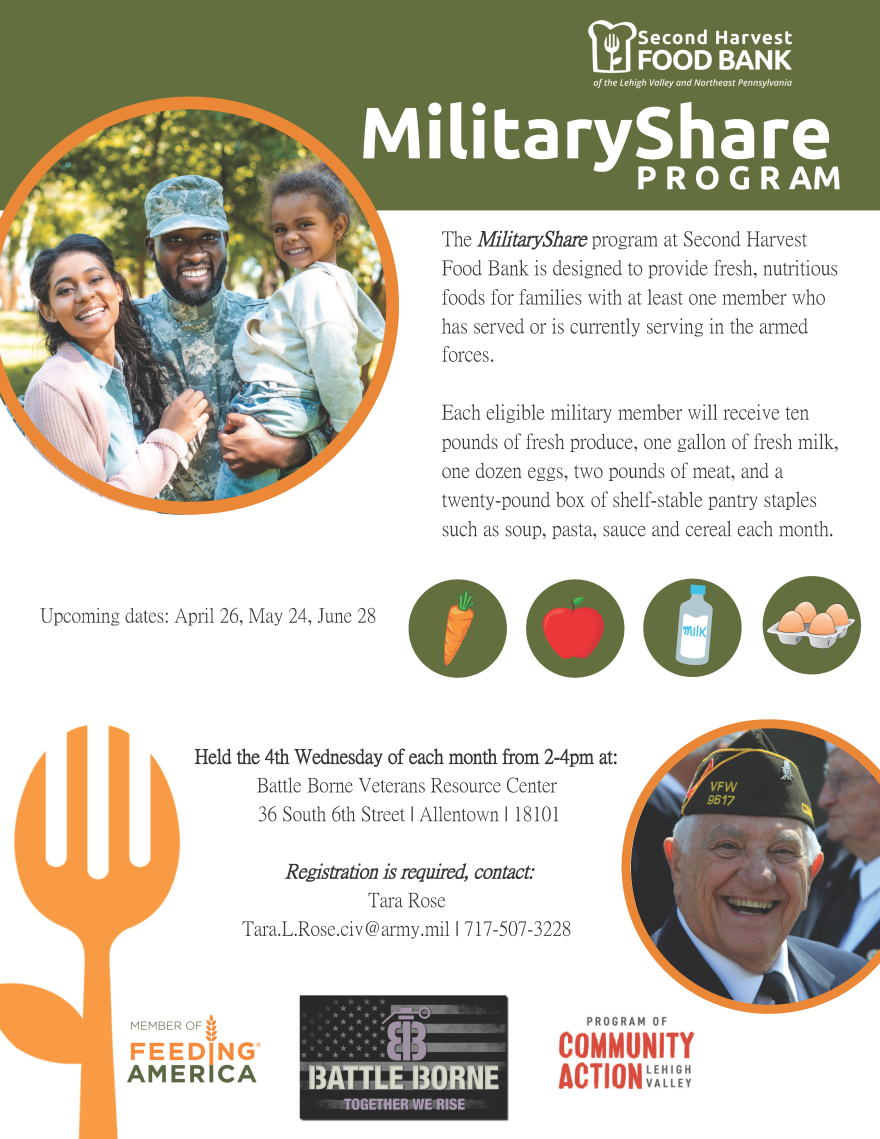
The Allentown center
Yarnell said it took him and his team five months to get the new Allentown center space ready. He wanted it to feel like a living room.
“We made it so that it didn't look like a space where you're coming to get diagnosed,” he said.
Recently, Yarnell said it has seen an increase in food insecurity.
Starting April 22, it will team with Second Harvest Food Bank for a military share food distribution.
“They don't want to feel like they're taking a handout. With Battle Borne, the mindset is always that we're a hand up. Getting help from a fellow veteran is a little bit easier than walking into a public place.”Chris Yarnell, founder of Battle Borne
Each box includes 10 pounds of fresh produce, a gallon of milk, a dozen eggs, 2 pounds of meat and 20 pounds of pantry staples, such as cereal and pasta.
Yarnell said it’s a partnership that makes sense, because veterans can feel uncomfortable or embarrassed at food pantries and soup kitchens.
“They don't want to feel like they're taking a handout,” Yarnell said. “With Battle Borne, the mindset is always that we're a hand up. Getting help from a fellow veteran is a little bit easier than walking into a public place.”
Battle Borne's support group "is not always about people coming in with needs,” Yarnell. “It's not always about, hey, I have PTSD, I need to process this.”
He said only six of its 12 members are in recovery from substance abuse disorders. Less than half of them struggle with PTSD.
What they really want, Yarnell said, is a space to be around people who share the collective and social experience of military life.
“If I'm having thoughts, or struggles with something, these other people are going to understand me, and aren't going to try to write me a prescription or lock me up,” Yarnell said.
He said it helps that facilitators also are veterans. Even though they’ve trained as social workers, they don’t conduct themselves in a clinical capacity.
“They are peers,” he said.
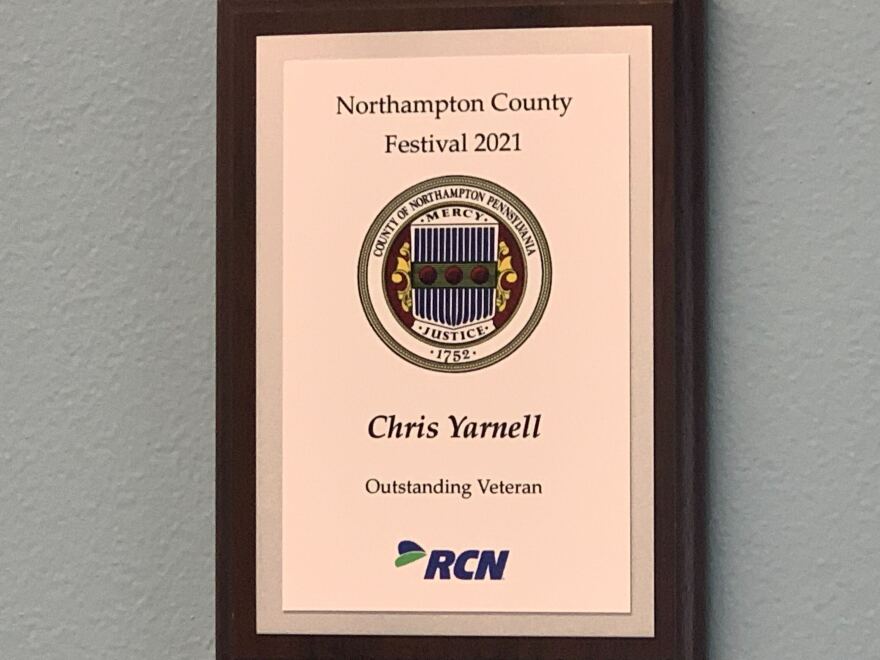
Five years, and a legacy
Battle Born will have its first gala July 15 to celebrate its five-year anniversary.
Yarnell said he also feels optimistic.
“I bought into the hype if you join the military, or you're gonna serve your country,” he said. “You're gonna help people. It was what I chose to do at that young age.
“Did I agree with everything they taught us in the military? No, but it instilled discipline. It instilled morals and values.”
He said it’s a mindset he tries to pass on to his son, who’s 11.
“If I never joined the Marines and had the things that happened ... good, bad or indifferent,” he said, “I may not have a heart to serve veterans.”

